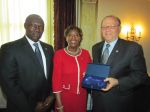In her welcoming remarks at the African American Chamber of Commerce Annual Meeting and Luncheon President and CEO Doris Carson Williams said the organization made gains during the last year because though it has gained the same number of members it has lost, the new members have much greater capacity.
She also noted corporate interest had resulted in her forwarding more than 4,000 requests for proposals to chamber members during the last year.
“Results from our corporate survey reveal that 90 percent of the respondents have contacted chamber members about doing business,” she said. “And all said they would do business with those firms again.”
Outreach, she said is improving. Part of that success she credited to the luncheon’s keynote speaker, Carnegie Mellon University President Jared Cohon, who almost immediately upon taking his position 14 years ago, began working with the chamber and in large part helped create the chamber’s Business Institute.
Cohon said CMU has embraced economic development and outreach since he’s been there for two reasons; first to be good citizens, and second, out of enlightened self-interest.
“We compete with Stanford and MIT, so the vibrancy of the city is key to our recruitment,” he said. “Since 1982, CMU and the University of Pittsburgh have seen sponsored research grow from $100 million to $1 Billion a year. The rule of thumb is each $1 million creates 30 jobs, so we’re up to 30,000 jobs. If Oakland were its own city, it would be the third largest business district in the state.”
However, Cohon said, despite creating a technology economy, now generating 12 to 20 spin-off companies per year, not everyone is benefiting.
“Pittsburgh has made a remarkable comeback since the death of the steel industry, but not for everyone. Google is in East Liberty—think about that. Intel is here, and Disney has one of its only two research centers here. These are executive, high-paying, wealth-creating jobs. But this greatness is isolated because the African-American community is not included. That has to change, but I don’t know how to do it.”
So, he said, he sought help. He, Allegheny Conference on Economic Development CEO Dennis Yablonski and Pittsburgh Mayor Luke Ravenstahl met with the Obama administration.
“We can make an innovation economy, but we need to make it inclusive,” he said. “We urged the administration to think about innovation in an inclusive way and to make Pittsburgh a model—you’ll be hearing more about that.”
In the meantime, Cohon said, CMU has managed to double the number of African-American students entering its freshmen classes to more than 8 percent, but doing more is difficult because only about 2,000 Black students graduate annually with SATs high enough to get in—and places like Stanford and MIT are after them too.
“So to increase high school grades, we increased our outreach to middle school students (with programs like its robotics courses) looking for kids with potential, diamonds in the rough,” he said. “Of the 800 kids who’ve graduated, 75 percent have been admitted to college—we got a few of them.”
(Send comments to cmorrow@newpittsburghcourier.com.)
